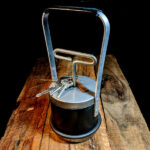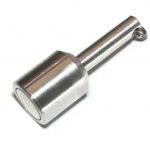
Plastic Keychain Magnet
Keychain Magnets as gift items to promote your business!. Letters and numbers can be imprinted.

Magna Pickup Magnet
The Magna Pickup is a light weight canister that can lift up to 8 lb and is completely portable.

Industrial Test Magnet
Primary Use: Industrial Scrap Metal Recycling – Gold And Silver Testing. Secondary Use: Heavy Duty Pickup

Strong Man Vinyl Coated Magnet
At 14oz the Strong Man can lift 150 Pounds of solid steel!. These are extremely powerful magnets.